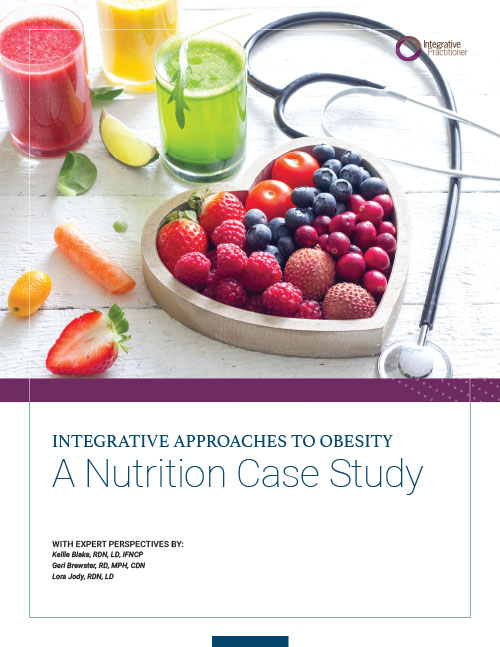Filters
Product Categories
Obesity is one of the most common chronic conditions presenting in integrative healthcare practice. Over 93.3 million Americans are considered obese by the U.S. Centers for Disease Control and Prevention, and obesity can lead to several serious conditions, including heart disease, stroke, and type 2 diabetes.

Presented by: Hyla Cass, MD
This session will describe the functions of the endocannbinoid system and demonstrate ways to wean patients off opiates and psychiatric medications using cannabidiol (CBD), and identify ways to select CBD products.

We’re in the midst of a growing epidemic of dementia and Alzheimer’s in the ageing population. A growing body of research is highlighting these conditions have a strong association with high blood sugar levels and pre-diabetes, which alarmingly is now seen in almost half of the American population.

Presented by: Rodney Yee and Colleen Saidman Yee
Yoga practice has steadily grown in the U.S. by over 50 percent in adults and more than doubled in children from 2012 to 2017. It is primarily practiced for general wellness and disease prevention or to improve energy. A growing body of high-quality research continues to validate its efficacy for a wide variety of health conditions including major depression, anxiety, supportive cancer care, hypertension, cardiovascular disease risk, diabetes, pain conditions, improved cognition, and much more. Research on neuroanatomy and nervous system activity are identifying the underlying biological mechanisms that elucidate yoga’s role in health and wellness.

Presented by: Mary Beth Augustine, RDN, CDN, FAND and Kathie Swift, MS, RDN, LDN, FAND
Test, don’t guess! Skip the polarizing diet and nutrition debates, bridge theory and practice, and take your nutrition assessment game to the next level with organ systems specific integrative and functional nutrition lab assessment.

There is growing recognition that solving the obesity epidemic and its downstream health consequences depends on preventative efforts at the individual, community, and public health level. Health professionals are on the frontline of assessing and advising patients on nutrition and weight; however only 27 percent of medical schools teach the recommended 25 hours of nutrition, and fewer than 14 percent of practicing physicians believe they were adequately trained in nutritional counseling. Other integrative disciplines, such as naturopathic medicine and traditional Chinese medicine, have a stronger focus on the healing power of food, but may be limited in patient behavior change when patients lack the confidence, skills, or motivation to change their diet.
The original Cooking Up Health (CUH) curriculum was designed to teach learners in medicine and allied and complementary health sciences through the lens of culinary medicine and community health. Through this course, participants learn basic culinary skills, steps to create nutritious meals, relationships between food, health, and disease, and cultural competencies around nutrition. The participants also practice health coaching and teaching.
For health professionals who ardently believe in the power of nutrition to transform health, culinary medicine provides practical tools to help learners, from patients to students to communities, put recommendations into action. Learn more about CUH and its powerful impact in this presentation.

Presented by: James Greenblatt, MD
This session will explore the tragic neglect and paucity of research on the high rates of suicide in adolescents. Suicide risk among today’s youth is overwhelming and poorly addressed, amounting to a public health crisis. Younger Americans are especially vulnerable. According to the Centers for Disease Control and Prevention, from 2006 to 2016 the suicide rate for children aged 10 to 17 increased 70 percent among Caucasians and 77 percent among African Americans. In 2016 suicide was the second leading cause of death for individuals aged 10 to 34. Despite these dire statistics, this pressing issue is largely ignored by the integrative medicine community.

This presentation will discuss how dysbiosis in the oral microbiome, as seen in the gut, will lead to inflammation, illness, and disease well beyond the oral cavity. There are over 700 species of bacteria in the oral microbiome. These bacteria harbor themselves in the many different terrains of the mouth – the tongue, the teeth, the gums, the palate, and in the roots of the teeth. Therefore, salivary diagnostics are so important to our overall health and wellbeing.

Presented by: Tara Scott, MD
There seems to be an increase incidence of premenopausal breast cancer in the United States. Traditionally, hormone replacement therapy (HRT) has been blamed as a causative factor and also genetics with BRAC 1 and 2. However, these premenopausal patients are not on hormone therapy, and many are negative for BRAC genes. Tara Scott, MD will discuss her hypothesis that there are other single nucleotide pleomorphisms (SNPs) that put a patient at increased risk of breast cancer, namely MTHFR 677, MTHFR 1298, and COMT.
MTHFR and COMT genes are involved in methylation processes in the body. This process is a large component of Phase 2 detoxification, especially for estrogen. Scott’s theory is that patients with SNPs in MTHFR and COMT have an impaired ability to get rid of estrogens and thus have an accumulation or back up of Estrone or the toxic metabolite 4-OH Estrone which can increase the risk of breast cancer. As a result, there is an imbalance in the hormones that cause hyperplasia (estrogens) and regulation an apoptosis (progesterone) in the breast.
This talk will explore the relationship of estrogen detoxification to breast cancer risk and also review the link with exogenous therapy.
This presentation was recorded at the 2022 Integrative Healthcare Symposium Annual Conference.

It is Impossible to Treat Cardiovascular Disease if you Ignore the Mitochondria


















